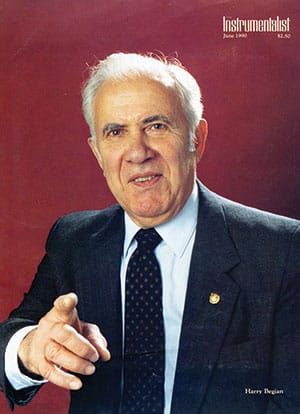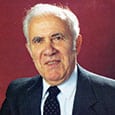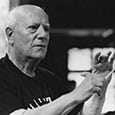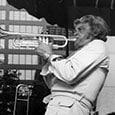Originally published: August 1992
When Harry Begian was a student at Wayne State University, the band performed Lincolnshire Posy under the direction of Percy Grainger on two of his visits to campus. Begian began his distinguished teaching career at Detroit’s Cass Technical High School and served in several college directing positions including as Director of Bands at the University of Illinois from 1970 to 1984. The following are excerpts from his recollections of Grainger’s musical interpretation and comments.
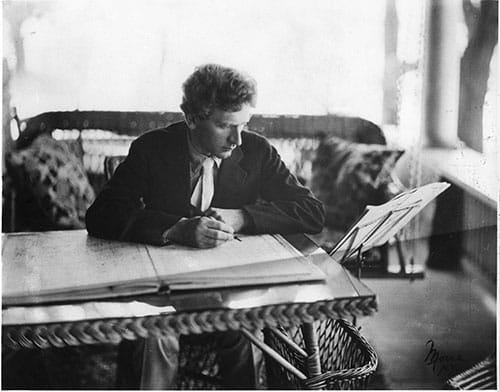
Percy Grainger
Grainger was such a remarkable personality that we hung on everything he said or did. He had a tremendous knowledge of music of all periods but came across as a non-conformist and an eccentric. On several occasions some of us asked Grainger a wide variety of questions about his music and about music in general. Quite often his answers were laced with references to the Renaissance or English Tudor music or facts about English history that influenced music. Percy Grainger was the most knowledgeable musician these undergraduates had ever met. At one concert, we heard Grainger as piano soloist when the band accompanied him in a performance of the Grieg Piano Concerto. What we heard and saw of Grainger on this occasion was a musical artist who had wonderful control of his instrument.
As a conductor Grainger was not the most graceful person on the podium: His physical movements were rather rigid, jerky, and he jabbed a lot, especially in marcato and accented passages. He used his left hand sparingly while conducting and kept it in his trouser pocket most of the time. He didn’t cue with his hands, giving cues by gazing in the appropriate direction. When he used his left hand, it was often rather spasmodic.
In rehearsal Grainger’s keen ears detected the slightest imperfections of rhythm, style, or balance, although he seemed less likely to correct slight pitch deficiencies saying, “Strict in-tuneness is a pedant’s goal, not a practical musician’s.”
Grainger spoke softly with a decidedly British accent and had a high-pitched voice. His speech was sprinkled with invented words: undowithoutable, intuneness, art-skills, personality-impresses, upbuild, mankind-rescuing, blind-to-gain, and saviour-heroes. Grainger stood out in a crowd as the individualist and eccentric that he was.
Although he dressed informally, favoring short-sleeved cotton shirts open at the collar, white-duck trousers, army boots, and a Harris-tweed jacket, he was neat and clean. I first saw Grainger five minutes before the first rehearsal he conducted at Wayne State University as he walked down the street to the band building in frigid weather with a knapsack on his back but without a hat or coat. He came into the building, went directly to the band director’s office, shed his jacket, got out his scores, and was on the podium at the appointed time.
Grainger was certainly not conservative or traditional is his music, dress, speech, conducting or philosophy. He was different in so many ways that he seemed to be from another place, even another planet; yet what he said was so incisive that there was never any doubt about what he said. It came as a shock to see him at concert time, elegantly dressed in tails, presenting a striking picture.
In rehearsals, Grainger was strictly business: no diversions, story-telling, or joking. His mind concentrated only on the music. When he stopped, he told why and explained how to correct the problem. Because we played Lincolnshire Posy from his manuscript parts, there were mistakes. When he heard a mistake, he jumped from the podium with a pencil in hand, raced over to the player, and corrected the part on the spot. He raced back and jumped up on the podium calling out a rehearsal number. Grainger always moved quickly in rehearsals, but never seemed to be in a rush with players. Although his conducting and baton technique were not refined, he spoke succinctly and positively about what he wanted to hear.
The rehearsals and concerts Grainger led at Wayne State University are unforgettable memories. I can recall them as clearly as though they took place a year ago. Each tempo, style, and inflection that Grainger asked for in his music is still vivid. I particularly liked the folk tunes Grainger used in Lincolnshire Posy and was impressed by his rich harmonies, the wind sonorities, and the mixed meters, polytonality, and polyrhythms. I asked him about the mixed meters in the folk songs in Lincolnshire Posy. He replied that they were notated rhythmically and metrically as they had been sung for him.
